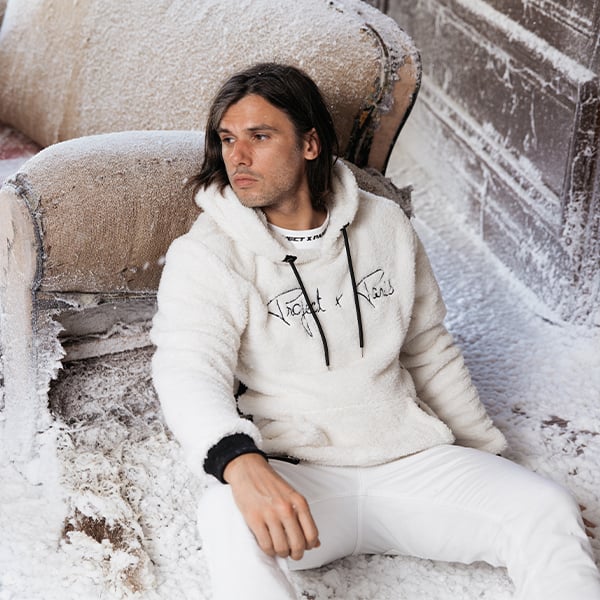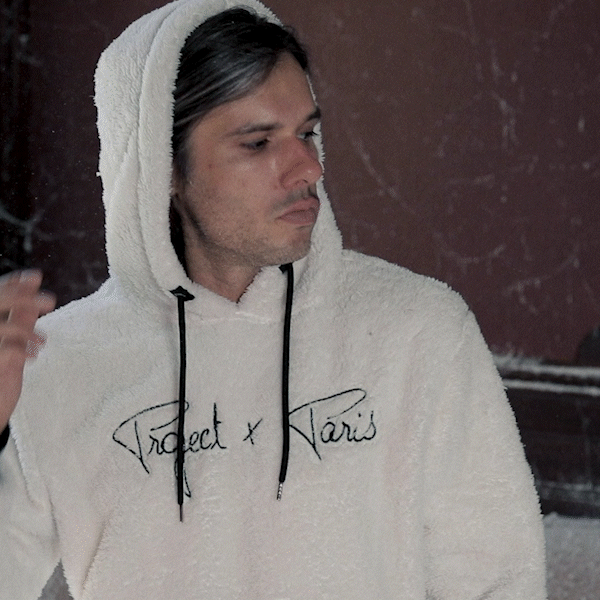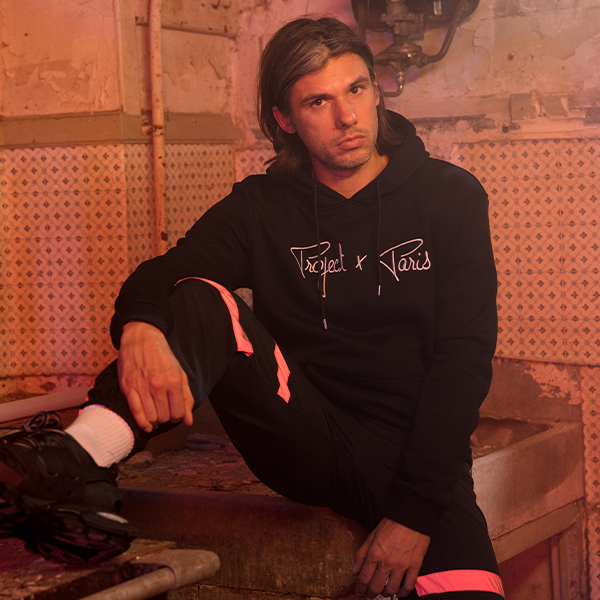- label Streetwear and urban culture news
- remove_red_eye 8296 views
Last year, Orelsan and his brother Clément blew everyone away when they unveiled a documentary series on Amazon Prime, "Montre Jamais ça à personne". The subject? Orelsan's musical rise, filmed from the inside by his little brother. It's an unexpected, authentic and impressive piece of work, which has been a big hit and helped boost Orelsan's popularity throughout France. It also teaches us a lot about a rapper's career, and about life in general.
Authenticity, determination and sharing
Those who got to know Orelsan at the very beginning of his explosion, shortly before the release of his album "Perdu d'avance", already knew him pretty well, and as the rapper is extremely sincere and authentic in his music, we already had an insight into his life and career. But the documentary series, "Montre jamais ça à personne", unveiled on Prime Video shortly before the release of his album "Civilisation", helped to make this true Normandy success story known throughout France. Above all, it made Orelsan even more endearing to the public, leaving the controversies of the past far behind. The series is filmed by Clément Cotentin, who is none other than Orel's younger brother, which guarantees a certain authenticity, since one behaves more naturally in front of a camera when it's held by one's little brother all day long. That this authenticity is to be found in the series is anything but a coincidence, since authenticity is perhaps the most important aspect of all Orelsan's music. The rapper has never made any secret of it, whether in his lyrics or in interviews, and has always assumed this simple, "average" side, with nothing really exceptional about it. Not least on his debut album, Perdu d'avance, where he rapped "j'suis un mélange entre hardcore et farfelu, Orelsan, parce qu'on ne change pas une équipe qui fait match nul". It's this simplicity that has made a lot of young people identify with him: the average guy, not particularly popular, not particularly comfortable with girls, a bit of a "wanker" at school or work, often beset by self-doubt due to a lack of self-confidence.

Le rappeur a très tôt dévoilé cet aspect de sa personnalité et ça a permis de faire de lui une sorte d'icône des jeunes de cette génération. Mais attention, le propos n'est pas de dire qu'Orel est simplement un gars sympathique. C'est un excellent rappeur qui a travaillé de manière très sérieuse pour peaufiner son art, et s'il se qualifiait de « branleur », c'était surtout à l'époque des études et de son travail dans l’hôtellerie, deux domaines qui ne le passionnaient pas. Une fois qu'il s'est mis au rap pour de bon, il a énormément bossé, s'est creusé la tête pour construire ses albums, ses concepts. On le voit d'ailleurs dans la série : Gringe a probablement un talent plus naturel pour le rap, en particulier sur les placements, le flow, les intonations, on le voit vraiment très à l'aise. Pourtant, des deux amis d'enfance qui se sont lancés dans l'aventure presque en même temps, c'est Orelsan qui est allé le plus haut et le plus loin dans ce qu'il pouvait proposer. Parce que c'est un bosseur acharné, en particulier quand il s'agit de sa passion, la musique. Derrière ce côté un peu blasé de tout, bien amplifié par son rôle dans la série « Bloqués », se cache un véritable bourreau de travail qui a su saisir les opportunités s'offrant à lui, même quand elles se soldent par des échecs, comme lors du concours de rap avec La Fouine et Booba en jury.
But above all, this series is a fabulous story of friendship and sharing. For Orelsan has always worked as part of a team, like most artists today. Don't believe anyone who raps "Je me suis fait tout seul" ("I made it on my own") - it's certainly not true, and the role of the people around you is vital for an artist. Especially since, in Orel's case, his entourage isn't just a background. His friends form a veritable fusion group, which has remained virtually unchanged since the start of the adventure, with Gringe of course, his partner in Les Casseurs Flowters, but also Ablaye, a sort of multi-hatted manager-producer-bookkeeper, present on all his stages since his first tours. And of course Skread, the conductor of the orchestra, whom the rapper nicknamed "Mozart" in the song "Jimmy Punchline". A group to which we can obviously add Clément, the little brother, who seemed to be there very, very often. The series tells the story of this fabulous, close-knit band and how they all supported each other (at times, it's a good thing Skread and Ablaye were there to put everyone back to work after a little bout of the blues) to get to the top. We also see Orel being very generous with those close to him, and eager to share the spotlight as much as possible, even though he doesn't feel particularly comfortable in it. Like with his buddy Gringe, or his grandmother Janine, who always dreamed of singing. Or with our brandProject X Paris during a shoot in 2019, when he had already launched his own Avnier brand.

Risk-taking and resilience
Le rappeur a également su comment retravailler son image, après des débuts un peu mouvementés via ses albums, sa série, son film ... Le rappeur a su inverser la tendance et transformer ces débats en popularité. S'il a toujours eu un côté un peu insolent et provocateur, sa personnalité est beaucoup moins conflictuelle que ce qu'on a pu entendre à certains moments dans certains médias. Lui-même n'a pas mis trop d'égo dans cette affaire, affirmant que la chanson qui faisait polémique datait déjà de plusieurs années et qu'il ne la jouait pas sur scène. On voit pourtant dans la série qu'Orelsan est sévèrement touché par ces événements, au point de faire une petite dépression, mais une fois remis il est revenu encore plus fort avec « Le Chant des Sirènes », l'album qui l'a fait connaître du très grand public.

An album of risk-taking, as we can see during its making, through Clément's camera, which gets better and better as the series progresses. Musically, the album bears no resemblance to previous French rap projects, unlike "perdu d'avance", where the influences are clearly identifiable. With Skread, they have taken their art to a new stage against the advice of many of their acquaintances in the music industry. These "risky" decisions, whether artistic or professional, may seem anecdotal, but put together they have a huge impact on their evolution. Like when Orelsan decided to sign with Wagram rather than Universal. This enabled him to keep control of his art and his creative process, rather than hiding behind art directors, which resulted in even greater success with his next two albums. There is no true art without risk-taking, and even less success without risk-taking, a lesson we learn in the series from the rapper's contact, particularly during the creation of the hit "La Terre est ronde", produced virtually solo by Orelsan.
Finally, the last important aspect of the series is resilience and not taking too much pride in things, whether they work out or flop. Knowing how to roll with the punches and get back up, as the rapper does on numerous occasions in the series. There have been lows and hard knocks, but each time the team has bounced back: after cancellations and controversy came "Le Chant des Sirènes"; a few years after his failure in the rap contest, he ended up winning a Victoire de la Musique award ahead of the rappers who had eliminated him at the time. Proof that hard work pays off, and above all, that knowing how to bounce back is an integral part of an artist's life, and not just a formula. When you burst onto the scene at a young age with a string of successes, the first wall you eat could well put an end to your dreams. But when you've had a string of failures, small victories or draws, you know that the wheel will turn, that you just have to wait and get back to work. It's an aspect that's very present in the whole gang, and we're really delighted to have been able to follow its fabulous adventure, and we recommend you do too!
